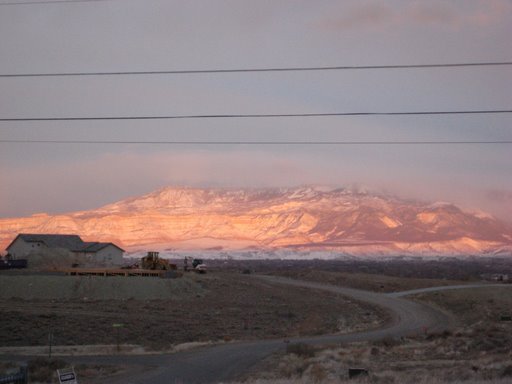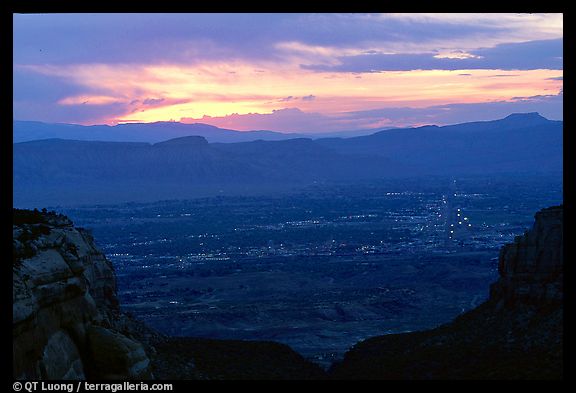Tuesday, November 17, 2015
Viewpoint: Clean Power Plan means more Colorado clean energy jobs
Long days outside while growing up on a Pennsylvania dairy farm instilled in me respect for the power of two of our planet’s most fundamental natural forces – the sun and wind.
Here in Colorado – where we have the potential for renewable sources of energy to power our entire state 200 times over our current needs – the sun and wind are powerful economic forces, too.
Colorado has been a leader in harnessing these valuable resources. Through commonsense state-level policies like our Renewable Portfolio Standard – which was enacted under a Republican governor in 2004 and ensures we generate a share of our energy from renewable sources – we’ve expanded our economy, created thousands of good, high-paying jobs and helped protect the fragile environment our tourism and recreation industries depend on by reducing the harmful carbon emissions that exacerbate climate change.
More recently, a new federal policy finalized this summer will help expand Colorado’s clean energy economy even further. This policy – the Clean Power Plan – sets the first-ever carbon emissions standards on our nation’s power plants. At a pair of public listening sessions downtown on Wynkoop Street this week – the only Clean Power Plan listening sessions west of the Mississippi – representatives from the Environmental Protection Agency (EPA) will be on hand to hear what people from across our region have to say.
Here’s what I and other Colorado business leaders will tell the EPA:
By sending a strong, clear market signal to the private sector to invest in low-carbon energy technologies like solar, wind and energy efficiency, the Clean Power Plan will help expand our state’s already strong clean economy.
Colorado’s booming wind energy industry alone has created between 6,000 and 7,000 jobs across the state at more than 20 manufacturing plants and nearly 30 wind farms. All told, Colorado’s wind industry employs nearly 10 percent of the entire U.S. wind industry workforce. Wind has also attracted nearly $5 billion in investment capital to our state and saved Colorado more than $20 million in fuel costs.
In rural counties like Logan, Prowers, Weld and Lincoln, wind farms have created a much-needed new revenue stream for farmers and ranchers. Because of small, unobtrusive wind turbine footprints, these farmers and ranchers can continue to work their land for agricultural purposes while simultaneously raking in lease payments. Combined, Colorado’s wind industry generates nearly $8 million annually in lease payments to farmers, ranchers and other landowners. These wind turbine lease payments – essentially a valuable new cash crop – help boost school district budgets so they can hire more teachers and buy more books.
Solar energy is also growing Colorado’s economy. Thanks in part to ongoing construction in Pueblo at what will be the state’s largest solar farm, Colorado ranked in the Top 10 for the fifth consecutive quarter in the latest clean energy jobs rankings published by the national nonpartisan business group Environmental Entrepreneurs (E2). Across the state, about 4,200 people work in Colorado’s solar industry, and they’ve helped install enough solar capacity in the state to power more than 76,000 homes – a number that rises each day.
Energy efficiency also has a big role to play in cutting our carbon emissions while growing our economy. In fact, using energy smarter in our homes, business and schools is the cheapest, cleanest and fastest way for states like Colorado to meet the Clean Power Plan’s carbon pollution standards.
Scaling up efficiency to help meet Colorado’s power plant emission-reduction target could save $4.8 billion and help create nearly 7,000 jobs over the next decade, according to another recent report from E2 and Golden-based Energy Efficiency Business Coalition.
Despite opposition to the Clean Power Plan by Attorney General Cynthia Coffman and some of her peers – who together recently filed a lawsuit that rests on extremely shaky legal ground given previous rulings by the U.S. Supreme Court – Colorado remains well-positioned to strongly implement the plan.
Doing so would grow our economy, create good jobs and attract to our state more businesses and their much-needed investment capital.
When EPA representatives are in town this week, that’s the message they need to hear.
Friday, November 13, 2015
Solar educators at Talking Green event
Butcherknife Brewing Company co-owner Nate Johansing is so supportive of solar energy that he’s bringing the beer to encourage other locals to show up and learn more about solar installation opportunities.
#The brewmaster is part of a team of local business sponsors working together to present a Yampa Valley Sustainability Council Talking Green educational event about the latest technology, grants, federal tax credits and local success stories for solar-powered electricity.
#The YVSC Talking Green event is scheduled for 5:30 p.m. Tuesday Nov. 17 at Moots Cycles at 2545 Copper Ridge Drive, which has its own 42-panel solar electric system. Speakers will include representatives from two local solar installation companies, who will discuss residential and commercial systems, and from Louisville-based Clean Energy Collective that built the Craig solar array, which has 20 percent remaining for sale.
#Johansing and co-owner Mark Fitzgerald will purchase a 12.3-kilowatt solar system for their beer-making headquarters to be installed by the end of this year. Johansing said the project is made possible by a $18,662 USDA Rural Energy for America Program grant, a 30-percent federal tax credit and a small business loan from Yampa Valley Bank.
#“We are really excited. We wrote it in our mission statement to be environmental advocates,” said Johansing, whose brewery opened in June 2014 on Elk River Road. “The movement in the craft brewing industry to be extremely aware of what is around us and to do as much as we can to use locally.”
#The brewmaster has a history of promoting environmental stewardship, such as work with a local biodiesel co-op. His company sources up to 70 percent of brewery hops from southern Colorado and 40 percent of its yeast from Woodland Park. The spent hop plants are sent up the road to Yampa Valley Farms for pig feed.
#With the heat produced from making beer and the new building’s tight envelope, the brewery owners rarely needed to turn on the room heating system last winter. Conduit was installed during initial construction in preparation for a later solar electric system, which is expected to cover 20 percent of the electricity needs, said Susan Holland, with solar installer Emerald Mountain Energy in Steamboat Springs.
#The system will include 44 solar electric modules made by SolarWorld.
#Johansing said installing solar power is another step toward collective sustainability efforts in the local community to prepare for the future when fossil fuels are more expensive.
#“Renewable energy really needs to be part of modern-day entrepreneurship,” Johansing said. “It’s really not that expensive, and you are building more equity into your building as an investment in those assets. If we do it all together in small steps, down the road it will create a much better framework to make bigger changes.”
#According to the Colorado Solar Energy Industries Association, Colorado ranks ninth in the country for installed solar capacity at 430 megawatts, or the equivalent of power for 82,000 homes.
#Some $212 million was invested on solar installations in Colorado in 2014, and average installed residential and commercial photovoltaic system prices in the state have fallen by 24 percent in the past year, according to CoSEIA.
Monday, November 2, 2015
Xcel wants to test battery storage for solar power in Denver
Xcel Energy Inc. is asking state regulators to approve a test of adding massive batteries to its system to store renewable energy and send the power to customers when they need it.
Xcel is proposing to add the batteries to its grid system for commercial customers at the planned Panasonic Enterprise Solutions Co. development near Denver International Airport.
The second test would support residential customers in the Stapleton neighborhood in Denver that has a lot of solar power panels on the homes.
The tests could be launched as soon as 2016 or 2017, according to Xcel.
"Our goal is to use these demonstration projects as a foundation for how to efficiently manage renewable energy on our Colorado system, and to continue to provide our customers with insight into the energy choices they want and value," said David Eves, president of Public Service Co. of Colorado, Xcel's subsidiary in the state.
Most people think of battery storage systems to provide back up power for solar power installations, but they can do more, Eves said.
Subscribe to:
Comments (Atom)




